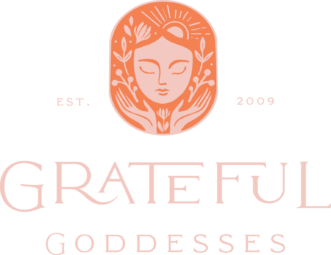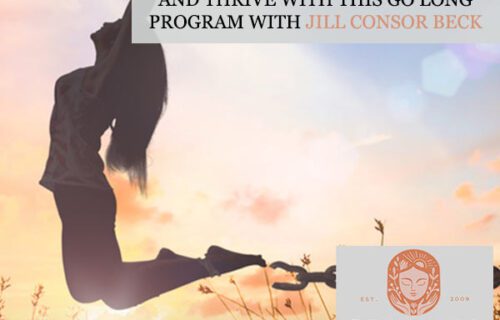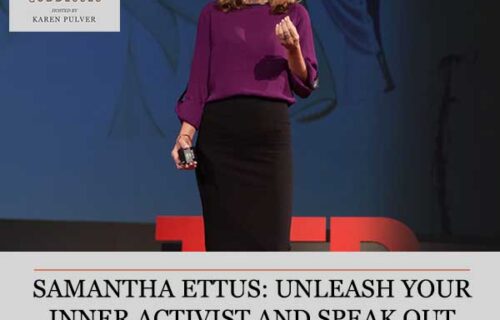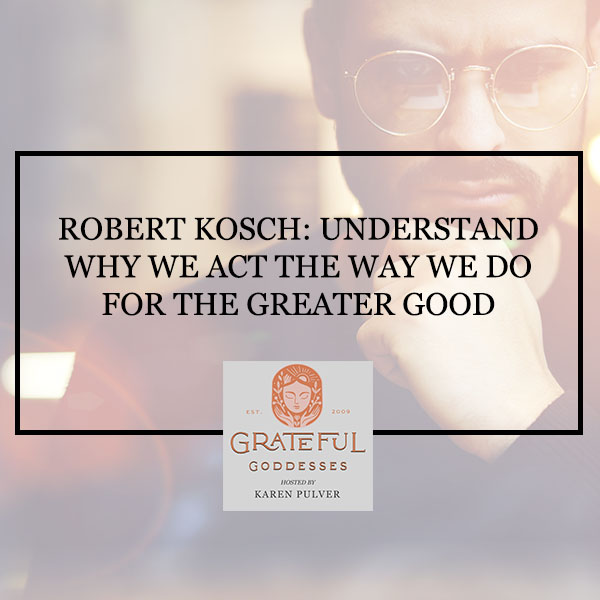
Robert Kosch: Understand Why We Act The Way We Do For The Greater Good
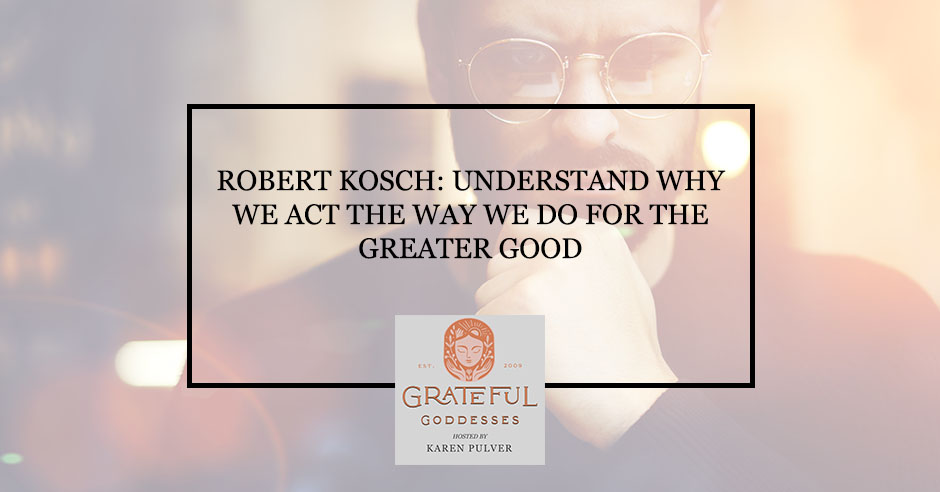
We all have our subtle prejudices and our way of thinking that may be insulting to someone else. Wouldn’t it be great if we could understand WHY we act and think the way we do for the greater good? This is the exact mission that Robert Kosch has. Karen Pulver and Goddesses talk to Bob about his past and his mistakes. He will take us through his journey of self-discovery from his 6 ½ years of jail time to experiencing “accidental anti-Semitism” to his current mission of spreading the “greater good.” Bob believes that there are better ways to communicate and come together through all the chaos and mayhem we call life. Along with comedy and a good laugh, Bob teaches us that there is hope to move forward.
—
Watch the episode here
Listen to the podcast here
Robert Kosch: Understand Why We Act The Way We Do For The Greater Good
Have you ever made a mistake? Have you ever done something and you thought, “What now?” After that, you realize, “I’m going to work towards doing better. I’m going to have a greater good mentality to help the world,” by the mistakes that you made. Our guest is Bob Kosch. He comes from chaos and noise in his early years. The same stayed with him as an early adult carrying him through the majority of his life. Bob, welcome to show along with our featured Goddesses.
Thank you very much. It’s a pleasure to be with you.
Tell us what that means, that you come from chaos and noise in your early years.
I suffered from learning disabilities when I was young. I could not read until I was in the fifth grade. To put it in mild terms, I fake the funk to get through kindergarten. I developed bad behavior. In an attempt to get a passing grade, I would look at other kids’ papers next to me when we were testing and things like that. I went to parochial school. I was beaten up at least every few days by teachers and nuns. It continued because I could not figure out what was wrong. They did not know what ADHD, dyslexia or any of it was. They said, “He’s lazy. Smack him around. He’ll come around.” I didn’t come around. That’s pretty much why I introduced my early life in that way.
If we do not get our arms and heads around the problems of anti-Semitism, it will all go bad. Share on XDid you complete high school or you dropped out?
I completed high school by the skin of my teeth. I got there.
How do you feel that your background, being raised like that and being dealt with in those situations, affected you later on?
They’re survival skills. Developing those traits or behavior patterns early in life caused a lot of problems or a lot of spokes out of a bad wheel because not only did I continue to try to get ahead. I always felt like I lost something and I got to do better. By trying to do better, I would always try to skirt rules and regulations, things of that matter. I got inventive in my own head. Sometimes you’re writing a fine line. Many times, you fall to the left when you should have fallen to the right. That’s a fair way to explain it.
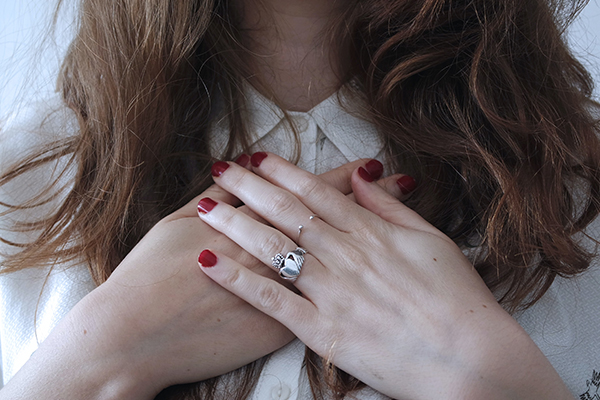
Camille has some questions for you about falling to the left.
We had seen your bio and saw that you had learning disabilities. What’s interesting to me is I’m also ADHD and dyslexic. I was diagnosed late in college but I wonder if you were given the right opportunities, would you have kept making those same choices? It takes a lot of intelligence even to be a criminal. What made you decide to go that direction instead of trying to use it for the greater good in that sense?
Let me explain and maybe even delve into your question before answering because not everything that I did on a daily basis was to skirt the law or try to get ahead. I’ve had some wonderful and joyous moments in my life. To give you an example, I was charged with wire fraud back in 1999. I was brokering loans to a company called Household Finance. If you had a pulse and a deed, they would give you $30,000 in ten minutes, as long as you provided them with certain information. They were called investor loans.
I had a number of properties that I bought for pennies on the dollar from tax lien sales. With what I was doing, they needed W-2s and things like that. I thought to myself and convinced myself that it’s real property. There’s never going to be theft because they can always foreclose on the properties. What I did was I would put together the W-2s which were bogus. They approved the loans. I would fix the houses in a matter of months and pay the loans off. I still got charged with wire fraud because that was wrong. I figured in my head, “No harm, no foul.” The no-harm, no-foul, even though you’re doing things wrong, doesn’t leave you right away. It was always in my head to play catch up with myself, not realizing that it may impact the economy. It may impact other people and things of that nature. There was no loss but it was that type of thing. I was always looking. It gets embedded in you or no people like me.
Comedy opens the door to conversations. Share on XI didn’t reach my epiphany until I was in my early 40s. I remember the day that this all came flooding into my head. It was like opening a book that had been sealed. I finally understood how to behave and why I should be following the rules and regulations of life. It then comes down to application. You’ve been doing something for so long and it’s just there. It’s part of you. I worked it all out.
What happened in 2013, I was arrested by the Sussex County prosecutor here in New Jersey for what they call theft of immovable property. I’m an expert in mortgage law and tax lien law. I’m not an attorney but what I was doing, I found fatal flaws in mortgage instruments when the economy tanked in 2008. I made a fortune. It was all legit. It was all completely above board but because of my past, they arrested me. Even though I sat with the police. With my background, the first thing in your head is you never talk to the cops.
I sat down and gave them a tutorial on how I did it, what the statute was, how I acquired it, and everything. They gave me twenty years after I lost the trial. Recapping to keep this short, fourteen months later, they reversed it and found no criminal liability in the charges. It took me six and a half years to get out of prison. There’s a long-winded answer for you. I strayed a little bit but hopefully, that does answer most of what you posed.
Thank you for sharing that. Alyssa is one of our recovering attorneys here. I’m going to let her jump in.
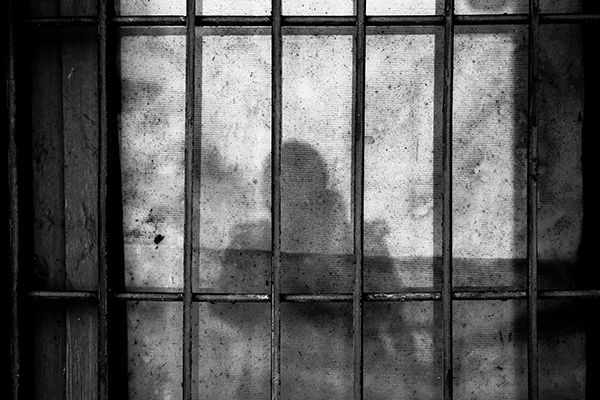
I’m not a tax lawyer or a bankruptcy lawyer but a recovering one. Here we are to take us through. You were given a sentence of twenty years and your serving time, not knowing at that time that you’ll get out in fourteen months. I assume you are going through the appeal process. You chose to represent yourself.
They made my attorney a witness in the case. They never called him as a witness. I’m in my late 50s. The prosecutor had told the judge that it was her mission to see me die in prison. With that attitude, I reverted right back to my younger days, “You want a fight? I’m your guy.” I did pretty well at the trial. I filed the appeal and it took fourteen months. In fact, at that sentencing, I told the judge, “The appellate court would make short work of throwing the case out,” and then he blasted me. It went back. As a recovering attorney, you’ll know when they reverse, they remand. They remanded it back to the sentencing court and the judge would not abide. They ended up vacating certain charges. It had to go back. It took me six and a half years until I finally got out. They threw the judge off the case and I finally came home.
For the non-lawyers, it means that the appellate court didn’t agree with the sentence and that it should be vacated, meaning it should be thrown out. You have to go back to the first court, but at the first court level, they’d have to do the vacating. They said, “No, we’re not going to do that. In fact, you’ll continue to serve.” How long did you serve, exactly?
Six and a half years.
There are ways to communicate and come together through our common spirit, even through the chaos and mayhem. Share on XI wanted to get back a little bit away from the legal event and into the time that you served. All the while, you’re spending probably a lot of your time on the legal side of it, the appeal and getting out. Tell us more about your experiences there and how they shaped the work that you do?
It’s when I entered Northern State Prison, New Jersey’s maximum-security prisons. In the years prior to my being incarcerated there, they closed a lot of mental health institutions. They are still housing a number of people who are mentally challenged, schizophrenic. It is absolute chaos. When you walk in the door, the noise and the staff are awful. They do nothing to help you. Getting in there and then realizing, “I’m going to be here for a minute. I hopefully can find something to do.”
To revisit what you had said about defending my case in the Appellate Division, I went to the law library and fortunately, the law librarian read some of the stuff I was briefing. I was helping some of my fellow inmates on post-conviction matters and things like that. They asked me to be what they call a counsel substitute. You’ve got to be a certified paralegal. I took the test. I passed it. Once you substitute counsel, you represent inmates who have violated institutional policy at a hearing. That’s anything from murdering your roommate, which I defended three people on, to spitting on the sidewalk. I stayed very busy in all this.
When I got in, when I came into reception, the officer that was at the desk was asleep. He’s the one in charge of filling out who you are and what’s your background. There’s a box that says religion. He looked at my last name and he marked me off as being Jewish. I’m Italian-Irish Catholic. I didn’t even know until the chaplain came by one day with a yarmulke. He said, “Here.” I said, “What am I going to do with that?” He said, “You’re a Jew.” I said, “I am?” He said, “By the way, do you want a kosher meal?” I said, “I’m a Jew.” The stuff that they put on those plates is horrible. I suffered a lot of prejudice for being Jewish in prison.
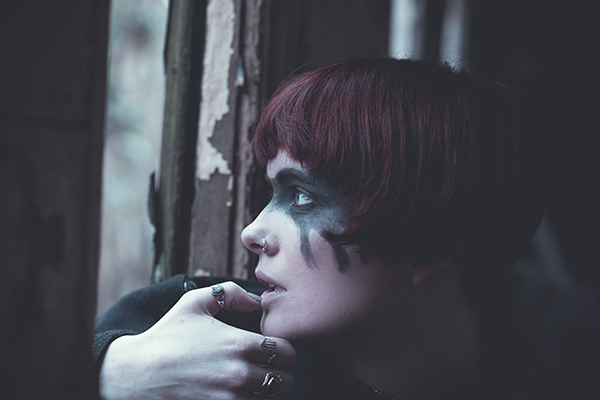
Prejudice from the inmates or prejudice from the guards?
Guards and inmates. It’s the population there. The Jewish population there was the minority. I was looked upon as being different. Fortunately, I was doing well in my role as counsel substitute. I beat a lot of crazy cases. I started to get a reputation that brought about people talking to me. I asked a White supremacist in there. I said, “Why do you hate the Jews?” As he’s thinking, I said, “Let me know if you heard this one. How come you don’t find many Jews in prison?” He said, “Why?” I said, “They eat locks.”
The locks on a bagel.
He didn’t have an answer. I went back and forth with a lot of people who were in particular groups. All of my roommates were either Bloods gang members, Crips, Latin Kings or Ñetas. I was able to communicate with them. Because of what I had done in the prison walls, they trusted me. We had a commonality.
When we hit the WHY button, it changes everything. Share on XWhen the time finally went by and I got out, it’s a mess out here. I lived through Vietnam, Kent State, and all the craziness that this country has endured. I did miss the Civil War though. There are ways to communicate and come together. I did that in the most god-forsaken place that offers the worst in what human beings have to offer each other. It is just chaos and mayhem. Through that, there’s that common spirit that when you come down to it, the biggest question in any language is why.
I learned first of all that a good trial attorney will never use that word, especially on cross-examination because it engages your deductive reasoning and it makes you think. If you’re ever in a violent situation, that three-letter word means everything. As soon as I hit the why button in there, it changed everything. You saw my comedy rap video, Cramdown. I’m a big goof. Let me put something out there that people at least get a couple of chuckles at. It’s pretty much a good way to have that commonality. If you can make somebody laugh or at least enjoy a good laugh with somebody, it opens the door to so much more, so much else.
I have two kids. They’re young men. They’re good kids. I did a promo for a 9/11 tribute we’re doing in New York on several stations. I quoted Thomas Paine who said, “If there is war, let it be in my day so my child will know peace.” I followed it up with Martin Luther King, “Let freedom ring.” If we do not address this today, it all goes back. I’m a World War II history buff. My dad saw the last few weeks of World War II. Being a phony Jew, I go back like, “How far away are we from when Germany was a civilized society that went upside down within a matter of a couple of years?” I feel this and I’m passionate about it so that’s it.
You come out of prison and Donald Trump is President. The world probably looks different than when you first entered prison. I know that Cramdown was a take on a bankruptcy term, but you used it in the more vernacular, cramming things down people’s throats. This and other meanings of it. A lot of your work and even the comedy, one might say, is a dark comedy and it’s political. I’m taking the timeline down the road here. You come out and leave prison. Your work now is not only about the greater good, but also your personal take on how you see the world. That might be committed to some and probably others.
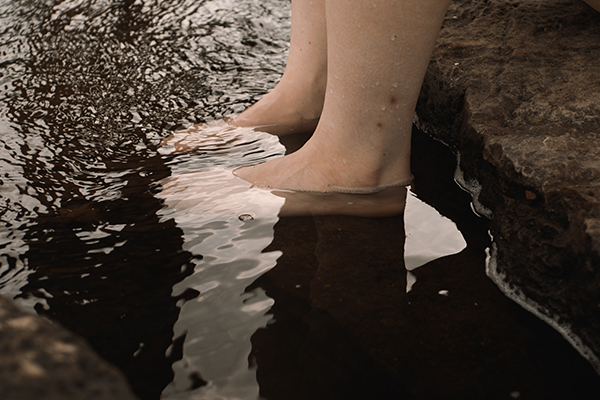
You start talking about politics. It’s not like years ago when you could talk politics in this country and it was a more civilized conversation if there were people from different viewpoints and perspectives. Now, it’s much more heated. People dig their heels in whatever party they want to be. They want to talk politics on the show a lot probably for good reason. I wanted to talk to you a little bit further about why this works? Why, in particular? As a Jew myself, I totally appreciate everything that you’re saying, what you experienced, and certain things in the last few years, reminiscent of certain attitudes in World War II. I get that. It’s a long-winded way of asking, why does this work?
Look at the country of Turkey and what Erdoğan did. It’s not a political show, and I don’t want to get overly political. Turkey was a democracy. If we go along the route that we are taking, January 6th was something that never should have happened. The Confederate flag never made it to Washington in the Civil War. Yet, it was under the Capitol dome at the beginning of January 2021. That frightens the living daylights out of me as an American. As someone who has been incarcerated where If I was in the Middle East, they’d have cut my hands off. Screw the appeal. This due process, the 4th Amendment and the 14th Amendment allow your rights to trickle down to the States. This all has to be preserved. I’m looking at it from a unique vantage point. I need people to understand it and see why, what, when, where and how I want to do this. It’s important to me.
I bet you’re getting involved because many times, people who aren’t part of a certain group or part of the global majority feel like they have to get permission to get involved or to speak up or speak out. I love that you’re getting involved. I wonder if you would have felt the same way if you hadn’t had the experience of being a fake Jew or a temporary member of the minority group. After the George Floyd incident, a lot of people’s eyes were opened from that. For you to have experienced anti-Semitism and racism, how do you explain it to others who maybe come from a privileged perspective and don’t always see things the way you’ve experienced them? Sometimes when I’m talking to people, I’m like, “I don’t need to explain my humanity or defend how I feel about the way other people treat me because of the color of my skin, my gender or who I love.”
From your perspective, I’m curious how we can get more people to see how damaging racism and anti-Semitism can be and how we can come together and work against it? Everyone’s goal should be that their children shouldn’t have to go through the wars that their parents are experiencing. My parents went through Civil Rights. My father was a freedom writer and my grandfather fought in World War II. I’m over this. I should not be having the same experiences.
We can do better because we've all got to become better people. Share on XIt’s 2021. I get everything you’re saying. I’m from Newark, New Jersey. I’ve been around Black folks all my life. When I was locked up, I shared a cell in particular with a young Black kid. We got to be best friends. He was 23. I’m in my 60s. We talked about the Civil Rights movement, the things that he wasn’t aware of, and what the Black population in prison was during those few years. The conversations that we had were about the questions and the concerns about what is going on out there.
My show broadcasts every Saturday morning on WOR. It’s on the iHeartRadio, Google Play and all these other places. In prison in New Jersey, when you have a call out where you have to go to either a doctor, you’ve got to schedule the appointment or something, there’s a process where that list is put on the TV every morning, “So and so is going here. We’re having a basketball game tonight. This is going on.”
They remind the prison population that my show is on Saturday mornings. It’s important. I had Bill Baroni on who is a former law professor. He was a defendant in the Bridgegate case. Bill and I have become friends. He ended up in prison. His case was thrown out by the United States Supreme Court. I engage a lot of my content. I did a show on sentencing for nonviolent drug offenders. I raised topics about custody, PTSD and all these things. I got two dozen phone calls from guys who are incarcerated and wanted to share or vent a little bit.
My biggest concern is people get radicalized in prison. Do you think the rumors out here are crazy to float around in the media sometimes? You got to hear half the stuff that goes on in there. I’m hoping that by communicating to that population, that they have hope. When you lose hope, it’s over. They’re communicating with me. Bill and I discussed getting out. What you can do and what you can’t do, and the restrictions. It’s healthy content for a place that simmers in crap every day you’re there, whether you’re doing a life sentence or a three-flat or something like that.
Unfortunately, I have spoken to guys who are serving life sentences in prison that will not take the vaccine because they’re hoping they’ll get the virus and they’ll die quicker. It comes from that place. It’s not a popular plan unless you’ve been there and experienced this. A lot of women or moms, how do you even think? I watched the podcast with Heidi Rome. I’ve had her on the show. There’s some of the autism. She’s a wonderful human being full of love. Did you ever consider, “What if my kid goes to prison?” Especially a mom. That’s why I’m involved in this because it’s hard to relate. The people that talk about recidivism. They talk about rehabilitation. They go home at the end of their shift. They don’t know what it’s like. It’s different. It’s a system that is broken.
Prison was started by religious zealots, I’m going to say and I don’t mean that in an insulting way. They figured that spending time alone with God would allow you to become a better person. The first two prisons were the Trenton State Prison here in New Jersey and Eastern Penitentiary. Prior to that, in Connecticut, they used to keep inmates in an abandoned copper mine and it was making people crazy. This is all wrong.
We need prison. Don’t get me wrong. There are elements that are evil and bad people. They need to be away from the rest of the general population for the greater good. In large part of this lock them up and bring them out on parole, when they violate for whatever reason, send them back, it makes no sense. It hurts families. A lot of this needs to change. If it doesn’t change, that’s the festering wound. When you look at these mass shootings. A guy runs into a mosque. Another one runs into a Christian church, a temple. It’s all going to stop. It can but it’s not going to be overnight. That’s pretty much it.
Bob, you’re currently the talk show host of the Greater Good Radio with Bob Kosch on Spotify or iHeart Radio. How did you start this? Tell us your future plans with that. What do you intend? What’s your mission with your radio show?
I broadcast off of WOR 710 AM in New York City. I had previously been on CBS WABC years ago, with music shows and comedy. In fact, I got my start as a talk show character by hiding in a locker with a cell phone we smuggled in the prison as a call-in comedy host. That’s the story. I enjoy it. Fortunately, the iHeart Media Group is going to take the show national.
I was at the Talkers Conference of Talkers Magazine, which is the bible of the talk show industry. They’re looking to change the face of talk radio. It’s not even talk radio now because of the podcasts. It’s all intertwined. Hannity got up there on the screen. He said, “I don’t believe the election was stolen. We’ve got to stop yelling at people.” I left there feeling pretty good. I’m cruising through the television and turn on a show. I’m right back to the same old crap.
What they told me at iHeart was that they liked the content I’m putting out. I’m not yelling at anybody. I’m not saying Trump is no good, Biden is a communist or Nancy Pelosi wears army boots. We don’t do any of that but we do engage in an intelligent conversation and a lot of comedy because laughter is everything. I’m hoping that this turns into a career and that career has an effect on our country as a whole.
The campaign that I have put forward is called We Can Do Better because we’ve all got to become better people. It’s not the bad guy. We all have our own subtle prejudices or ways of thinking that we might not think is insulting to someone else. These are the types of things that I would like to bring awareness to in a subtle way and make people understand using the question why.
Before we go, I wanted to read the last part of your song, A Form Of Something, “Thoughts in my mind, they don’t flow. They just grind. Why can’t I figure it out? He’s running wild but he’s still your child. It’s your turn to figure it out,” which pulls together you and your life, and how you have turned a mistake or a few mistakes and you are doing the greater good. You are turning things around which is difficult to do. I’m sure it’s hard because the mistakes keep popping up, “He did this. He did that. What about this?” It’s hard for people to shift their attitude but I encourage people to reach out to you and hear your story. How can people do that if they would like to speak further with you or hear what you’re working on?
You can go to www.GreaterGoodMediaLLC.com. My phone number, which anyone is welcome to call, is (973) 900-2831. I’ll be glad to talk to anybody about any of this. Thank you so much for having me on. It was a pleasure meeting all of you.
Thank you for your vulnerability and for sharing your story. We are grateful for all that you’re doing to move forward to create positivity in our world. Thank you for joining us on the show.
Take care.
—
What do you think about our interview with Bob? I thought it went well. He’s doing good.
It’s interesting. I think of Rachel Dozle where she pretended to be Black for years. I can imagine pretending to be part of a group that receives racism, especially in prison, for food. At first, I was like, “Why would anybody want to put themselves through that?” I could understand doing the opposite of trying to pass to have an easier life, not a harder one.
I’ve tried to pull it out of him a little bit. To go into prison several years ago, the Republicans and the Democrats are not at war with each other like they are now, and we didn’t have a pandemic. It’s a very different place. For him to open everyone’s eyes to what’s going on when you live through it every day. He also went into prison when social media was not what it was now. He has this article that I was going to ask him about. It was about short-form communication like tweeting, Facebook, emoji, and how that’s a horrible way to communicate. He’s not doing a lot of social. He’s doing radio.
Before all this happened, he’s an executive producer of When Comedy Went to School, which premiered on January 2021 on PBS. If you watched that, that’s dealing with the Jews who were comedians who couldn’t perform in New York. They had to go to the Catskills. He already had that mindset of understanding anti-Semitism. For him to then be faced with it firsthand, I find that interesting. If more people experienced it firsthand, they could understand the impact it has on people and the ripple effects. I do feel what he’s doing now is honorable and it’s hard to escape. When we’re talking about having him on, I was nervous because I was looking at his background and I was like, “A convicted criminal. This is our first convicted Goddess criminal.” The whole point is he learned from his mistakes. He’s moving forward and I hope he stays on those tracks.
There’s redemption as well in that sense. We all want it. Accountability culture is what I call it, as opposed to cancel culture. He’s showing that although he did bad things, he’s trying to redeem himself. He’s trying to do better and do all of that. That’s the difference between being cancelled and not. You come out of your bad situation to do better or The Greater Good.
I hope people tune in to that. Thanks for discussing because I got goosebumps with some of the things he was saying. Thinking about that as a teacher, children who now are diagnosed with ADHD and dyslexia and how much support they are given. I can’t imaging being beaten for that and how that would affect a human being. Any other final thoughts?
That’s why I wanted to ask him more about that because I feel sometimes when you’re labeled with a learning disability, you don’t want for people to assume, “You’re bad,” all the negative stuff with it. I’m curious if that added any pressure to him as well as being abused for his learning disabilities. Sometimes when you’re labeled a certain way, it’s hard to ever get past that. That’s what he kept explaining even with his prison stuff. It’s like, “We want to see you die in prison.” I knew we had limited time, but I was going to ask if he felt like he still has a target on his back much like being on a minority in that sense where you’re always feeling like the cops are always trying to get you. Every time you try to do good, they’re coming to check behind you.
He does but he’s learned to shift and he’s pushing forward. That’s the key. He’s pushing forward on the whole opposite spectrum to do good.
—
Everyone, welcome to Favorite Things with our guest, Bob Kosch. One of my favorite things that I was inspired by our Featured Goddess, Alyssa here, is my bracelet. It’s a Kabbalah band or string. I ordered it off of Amazon. It’s supposed to help you with protection and feeling grounded. It’s supposed to be from Israel. I don’t know if it’s fake, but at least I’m thinking about it being real. You tie it seven knots. You have someone who loves you, say a prayer as they tie it.
As you wear it and it’s not needed anymore, it will eventually fall off. What I like about this is it’s not specifically just one religion. It comes with this packet that talks about how it would be used in the various religions of protection. I feel like we all need to create boundaries and protect ourselves from any evil out there and move forward with good. This is my Kabbalah string. Alyssa, what did you bring?
This is inspired by another Featured Goddess, Rachel. We were together. This is my new favorite thing. I’ve been drinking them all day. It’s water but it’s flavored in a natural way. No calories, no carbs, no fat, nothing, just some natural sweeteners that come in all different flavors. I got a giant thing bought from Costco and it’s been hot and sticky. I’m in Chicago, as is Karen. It’s brutally humid and hot here. Hint Water is my plug for the day. It’s helping me stay hydrated.
Thank you for sharing that. Camille, what did you bring?
I joined this new app. It’s called The Balanced Life. It’s for women. It has all these different recipes and Pilates and different things that you can work out together. You can create your own calendar and all this different stuff. I’m still too scared to go to the gym but I need to get back in shape. I’m so tired of feeling flabby. This is the new thing that I’m hoping to get me back into shape on a routine because it’ll remind me to stay with it, hopefully. I don’t like working out by myself.
I saw that. I was wondering if it was a good app so I’ll let you test it out. Let me know since you’re doing that. Bob, this is like an adult show-and-tell, if you remember in school. It’s all about bringing things that bring you joy and sometimes it’s related to the topic, sometimes not. These are things that we love that make us happy. What did you bring along?
The Atlantic Ocean. It is a church for me. I am fortunate to live five homes away from it. When I’m done with the other thing I got to do here, I’m up there like a Saturn V rocket. There is nothing better than listening to the seagulls and getting your feet wet. It’s the comfort that I get from that so pick an ocean, a sea, a body of water, a bottle of water or anything. That’s what I got.
I hope our readers are taking in all of our favorite things and perhaps trying some out for themselves, whether it be a walk to the ocean, trying a new app that will inspire them, drinking delicious flavored water, or wearing some protection or protecting yourself spiritually. With that, we’ll say thank you again, Bob, for joining us on the show.
It’s my pleasure meeting all of you.
Important Links:
- iHeart Radio – Greater Good Radio with Bob Kosch
- Heidi Rome – past episode
- Hannity
- Spotify – – Greater Good Radio with Bob Kosch
- A Form Of Something
- www.GreaterGoodMediaLLC.com
- Hint Water
- The Balanced Life
About Robert Kosch
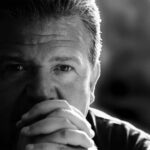 I come from chaos and noise in my early years. The same stayed with me as an early adult carrying me through the majority of my life.
I come from chaos and noise in my early years. The same stayed with me as an early adult carrying me through the majority of my life.
The following link connects to a song I wrote called: “A Form of Something”. It pretty much explains where I was and where I’ve gotten to until I ended up in prison. I am including the lyrics.
